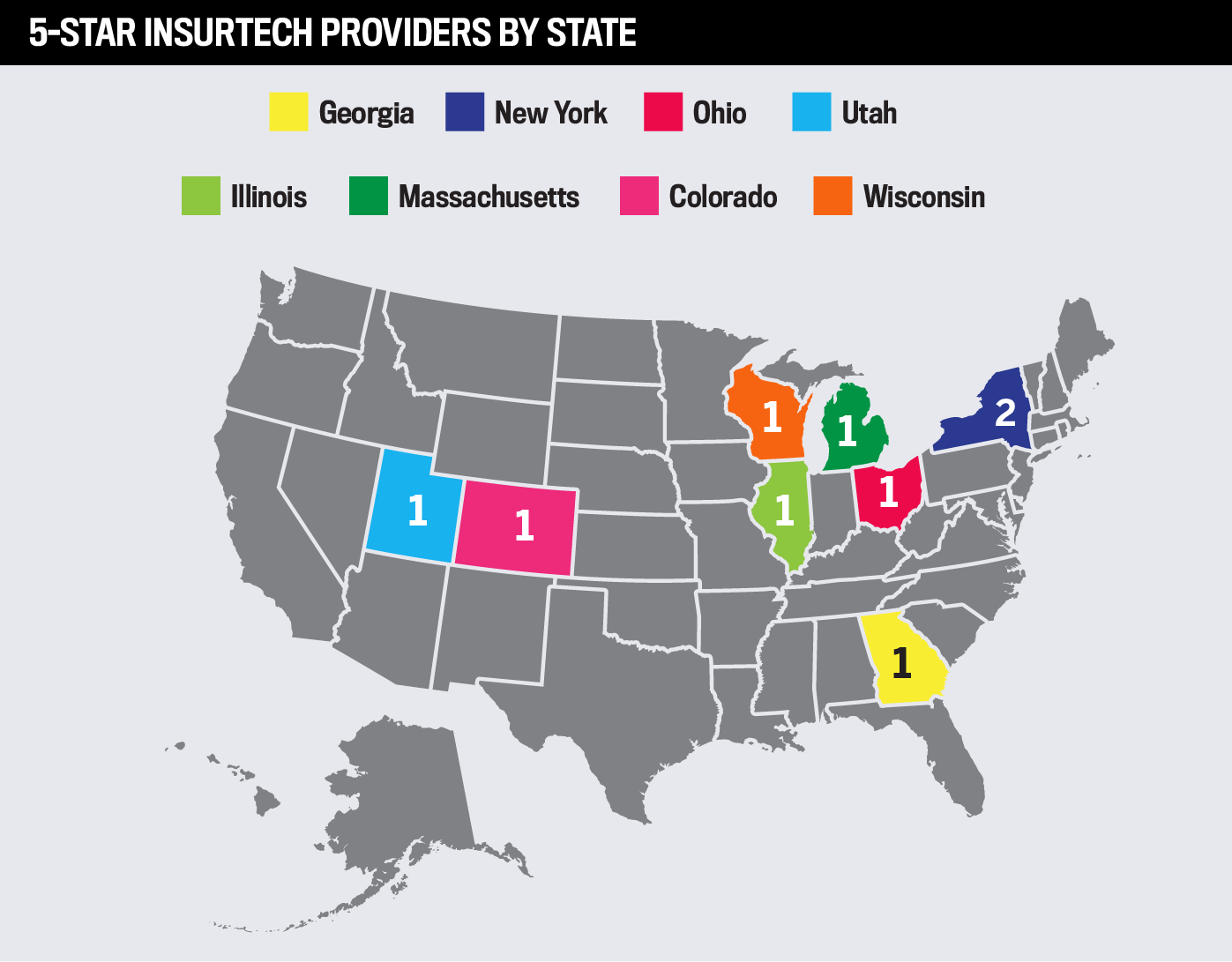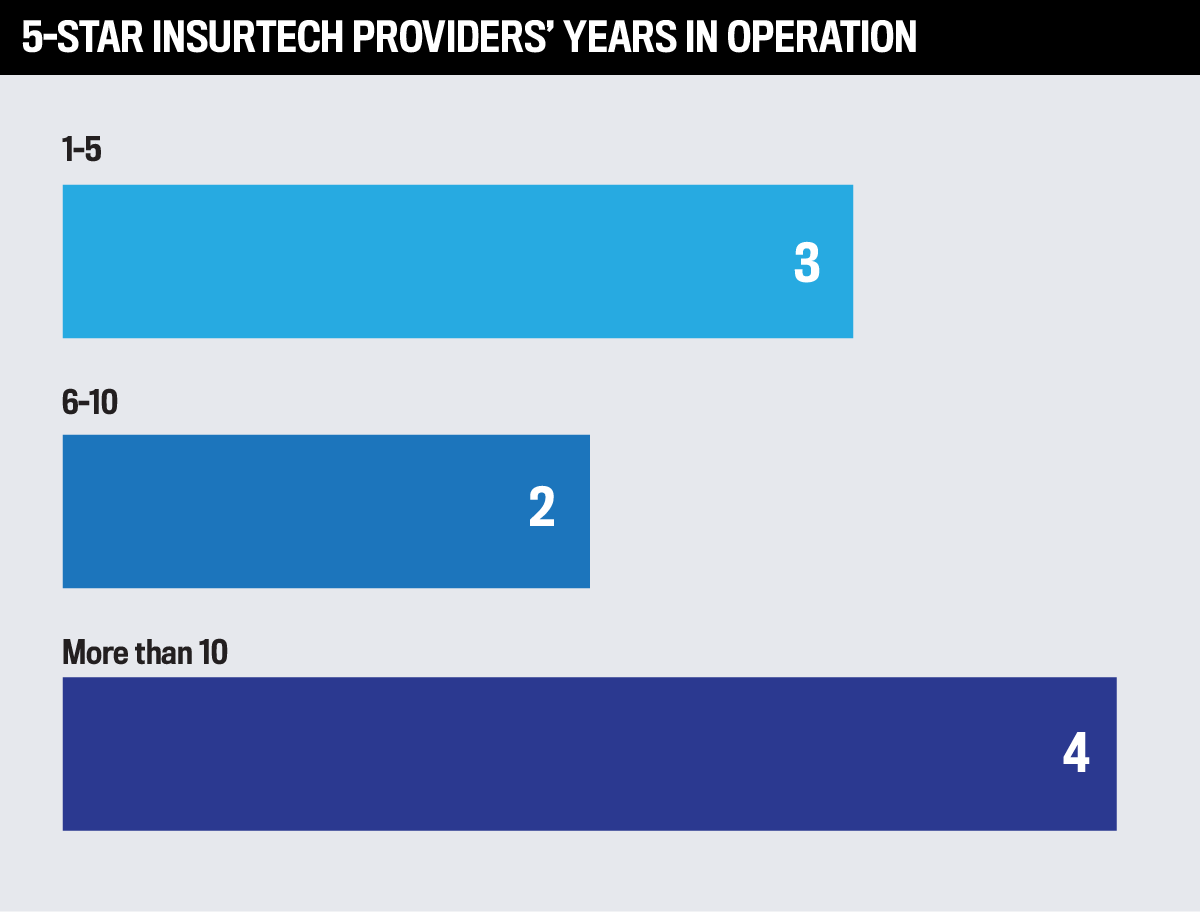jump to winner | jump to methodology
Empowering Insurance
Numbers don’t lie.
According to McKinsey: “Insurtech is driving digital innovation and disruption in the industry, with global investment in insurtech growing from $1 billion in 2004 to $7.2 billion in 2019 to $14.6 billion in 2021.”
“Over 40% of insurtechs are focused on the marketing and distribution segments of the insurance value chain, enabling them to address customer pain points through digitally enhanced customer experience that can pose a competitive threat to incumbents.”
The Insurtech Global Market Report 2022 is equally upbeat. The company expects a compound annual growth rate of 29.2% as the market value increases from $8.07 billion in 2021 to $10.42 billion this year.
“We are a non-profit organization dedicated to preserving voices in our industry that are often excluded or minimized. We bring more voices to the space, especially those that are often underrepresented”
Elisa Stampf, ensuring equality
Ty R. Sagalow, CEO and founder of Innovation Insurance Group, predicts that “in 10 years, insurtech will simply be called insurance. Eventually, it will take over the insurance industry”.
The United States is a particular hotspot due to the combination of the country’s tech industry and legal framework.As Alan Demers, president of InsurTech Consulting, explains, “For example, I’m in Columbus – there’s a strong insurtech movement here. Miami, Denver, Boston, Austin, etc. [others] Seeds were also planted, and we’re starting to see benefits from it. “
2022 Insurtech providers thrive in this booming industry, and Insurance business Celebrate their leading technologies that help transform partner and customer experiences. From digital platforms supporting traditional industry services to lone rangers offering new solutions to the market, they stand out from the competition and are supported by brokers who use them on a daily basis.

Amplify excluded sounds
One of the winners is Insure Equality, a platform similar to Glassdoor but geared toward the insurance industry and focused on diversity, equity, and inclusion (DE&I), but is often underfunded and overlooked. In Culture Amp’s 2022 survey of HR and DE&I practitioners, 81% of respondents are confident in their DE&I programs. However, only 34% said they have sufficient resources to support these initiatives. A global study conducted by United Minds last year reported that 78% of senior DE&I leaders agreed that their jobs would not be prioritized unless there were obvious or public issues.
Insure Equality’s technology enables employees to share their stories and enables employers to track progress towards improving their culture while striding towards DE&I goals.
“We are a non-profit organization dedicated to preserving voices in our industry that are often excluded or minimized,” said Elisa Stampf, CEO and co-founder of Insure Equality. “We’re bringing more voices to the field, especially those that are often underrepresented.”
For example, McKinsey’s Women in the Workplace study shows that one of the most misrepresented groups is women of color, who face “broken rungs” challenges.
“For every 100 men promoted to manager, only 86 women were promoted,” the report said. “Therefore, at the manager level, there are significantly more men than women, which means that there are far fewer women being promoted to higher levels.”
In June, Insure Equality launched an employee survey platform called Phoenix, which achieved 40% monthly growth with limited marketing. 75% of the company’s customers are Gen Z and Millennials. Employers, on the other hand, can track their progress and see where they need to work harder or harder.
Employees rate their companies, but Phoenix is much more than that. “We don’t focus on star ratings and percentage ratings,” Stampf said. “It has more to do with the ‘feel’ of the culture and whether you like where you work.”
To help eliminate fears of retaliation for bad reviews, Insure Equality offers a safe haven feature where users can choose not to let employers see the information provided. In addition to Enhanced Profiles, the company is also working to provide a paired certification program that helps businesses gain insight into their existing policies and put them on the right path.
What else makes Insure Equality unique? Its workers are mostly volunteer teams. “Almost all of our funding comes from donations [goes] directly into our programmatic campaigns, so people [are assured] Donations will go to important places,” she added.
“We’ve built our own platform to connect to all the different flood carriers and provide agents with actionable instructions and quotes in real-time according to the carrier’s wishes”
Martin Burlingame, One80 Agent

Flood Victim’s Ark
Another winner was Noah Flood, a flood insurance platform from wholesale brokerage and project manager One80 Intermediaries.
Floods are one of the most common natural disasters in the United States. They have cost U.S. taxpayers $850 billion since 2000, accounting for two-thirds of the total cost of all natural disasters, but only one in 10 homes is flood-insured, and that number will soon decrease . According to a FEMA report obtained by The Associated Press, 1 million fewer Americans will buy flood insurance by the end of the century due to increased costs.
Noah Flood offers a variety of different carrier quotes and compare rates for renewals based on current policies. According to Martine Burlingame, national director of contract binding at One80 Intermediaries, there are many similar platforms on the market, but none have access or the ability to set policy.
“So we built our own platform that connects to all the different flood carriers and provides agents with actionable instructions and offers in real time, as the carrier wishes,” he said. “We have five carriers now — we hope to have nine by the end of this year.” They are also trying to integrate the platform with the National Flood Insurance Program system.
For Burlingame, a major problem with the insurtech market is that entrepreneurs build disruptive products while ignoring middlemen, hindering profitability. An example is a simple business-to-consumer model that reduces agency distribution.
“We are directly concerned with the agent’s access to the operator, which is a binding offer that appears on their screen in real time,” he said. “It offers lines of business that don’t really have a multi-operator bondable option. There’s software that lets you enter and get quotes, but you might not have those carriers. Within the system, that’s kind of lucrative for us The product.”
Regarding onerous government regulations, Burlingame said One80 handles a lot of tax-related issues. “We have 51 residences, and if you add DC, they all have different forms, different bureaus, different taxes,” he explained. “Some states don’t require flood due diligence, others do. They keep updating their forms. Some have to be signed by individuals. Some have to be notarized.
“It’s chaos. It just needs to be cleaned up by the states, and they’re never going to get there. So, it’s not just a headwind, it’s like a strong wind.”
“We’ve probably done 10 years of transformational work in the last few years”
Rich Belanger, Applied Systems
Epic underlying technology
Another 5-star winner was Applied Systems for its Applied Epic and Applied TAM products. The former is a cloud-based system that enables agencies to manage everything from roles and locations to lines of business, including P&C and benefits. TAM stands for Acting Manager and provides an overview of customers and day-to-day operations; it also allows for the automation of workflows between insurance companies and their partners.
Rich Belanger, CTO of Applied Systems, explained: “We have a suite of products that range from enabling automation and marketing automation to mobile access, and our products are designed to enable agents to do every aspect of their business from prospecting to work”
Regarding recent market conditions, Belanger said Applied Systems sees a lot of activity across technology sectors and an opportunity to bundle recent acquisitions together to create a larger ecosystem. The pandemic has had a positive impact on the insurtech sector, he said.
“We’ve probably done a 10-year transformation in the last few years,” he added. “And, of course, we’re seeing a greater willingness to fix some of the older, more broken manual processes that have brought a lot of innovation to startups and a lot of money roaming around.”
Belanger says Applied Systems differentiates itself from the competition by offering 24 x 7 on-site staff support and delivering what he describes as a “simple, enjoyable and elegant” customer experience.
“It’s not a top priority for many ERP systems,” he said. “But why shouldn’t it? You pay so much for people like us, why shouldn’t it be a wonderful and enjoyable experience?”
At the same time, Belanger agrees with Burlingame that taxes are a major headwind, especially for property insurance, which varies significantly from state to state.
“As a fairly large market player, it probably gives us an unfair advantage, right?” he said. “Because we have the ability to track all the things these startups don’t have. So, if I put on the capitalist hat, I think all the regulation ends up tilting the market in favor of bigger suppliers.”
- Application System (App Epic and App TAM)
- Cover Genius (XCover)
- Fatty agent
- InsCipher (InsCipher connection)
- Ensure Equality (Phoenix)
- Nayya (selection)
- One80 Intermediary (Noah’s Flood)
- Zywave
“Market leading” is a phrase that many technology companies like to use when describing their software. Now, there are nine companies that can earn that title, backed by painstaking market research by the most important people (insurance brokers).
Selected as a five-star insurtech provider in 2022, US insurance business A call for nominations has been issued. Technology providers are asked to nominate their products, explain what makes them the best in the market, and why they stand out from their competitors. The IB America team then contacted brokers and asked them to vote for the insurtech providers they had dealt with. The top-scoring technology and software providers are named 5-star award recipients.